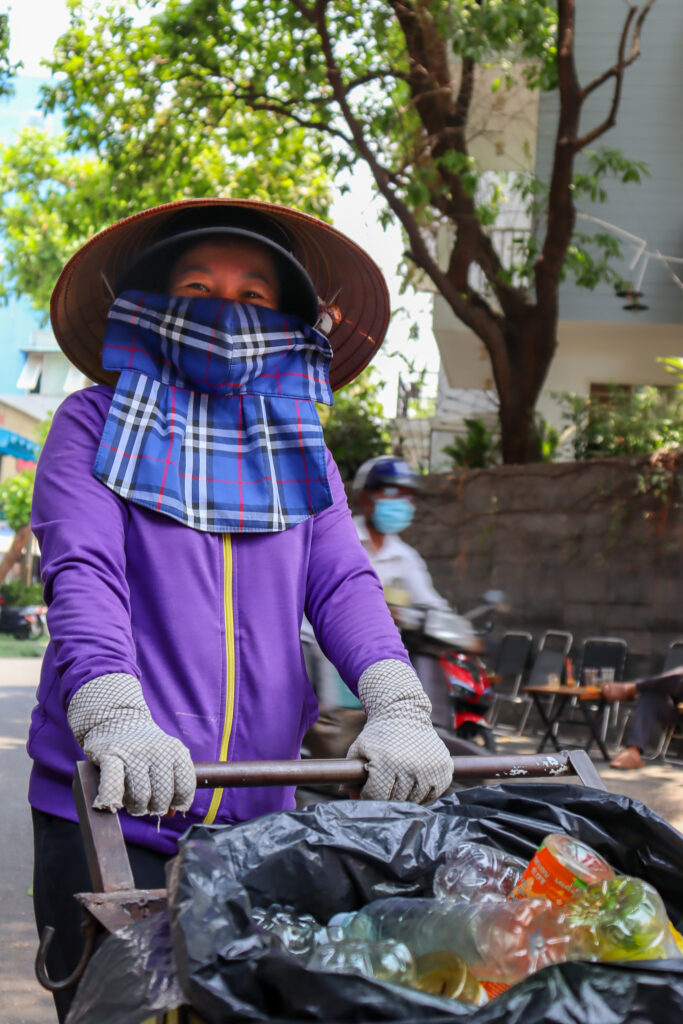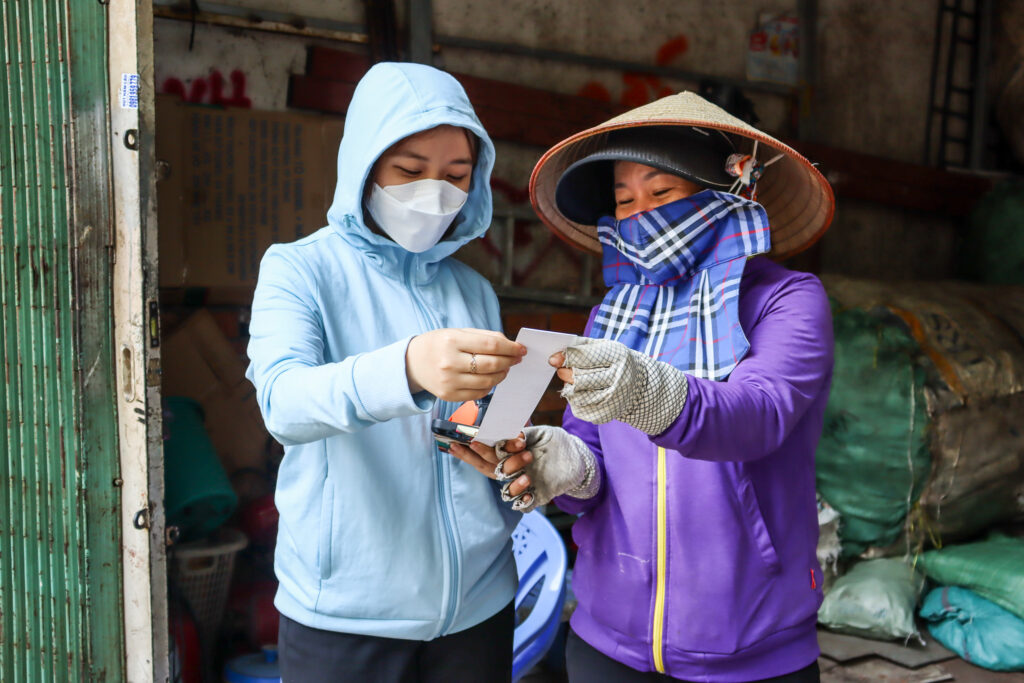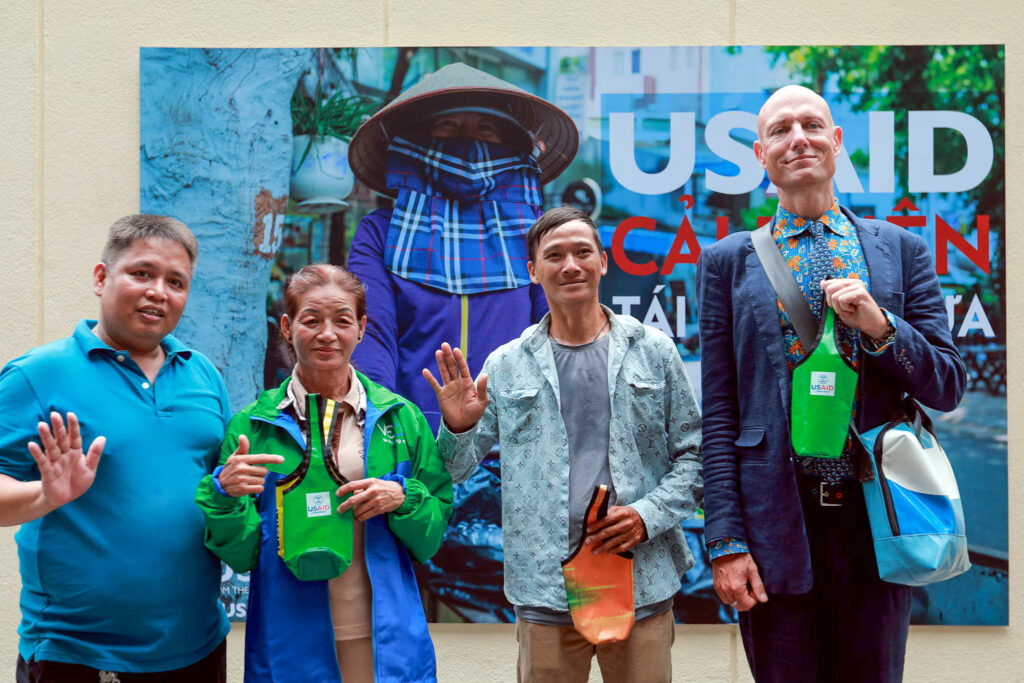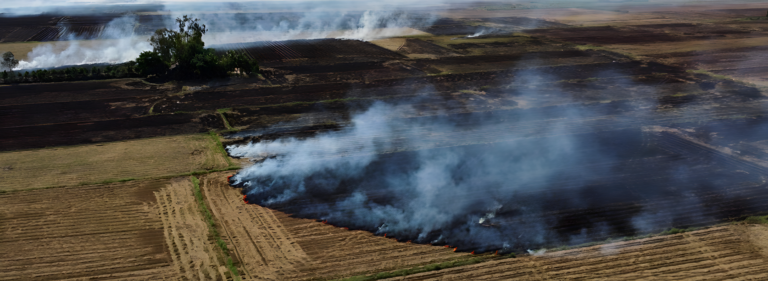
Silent heroes: Partnering with informal waste collectors to reduce plastic pollution
Plastic waste: A never-ending challenge
By: Hanh Nguyen, USAID Reducing Pollution project
Each day, massive amounts of plastic waste continue to be generated in cities across Vietnam. With 1.8 million tons of plastic discarded annually, the recycling rate of just 27% feels alarmingly inadequate. Each year, between 280,000 and 730,000 tons of plastic waste end up in the ocean — equivalent to the weight of about 2,000 to 5,000 blue whales. In the face of this challenge, we must ask: Is there a way to change the present course and avoid leaving a polluted planet for future generations?
The solutions might not lie solely with large factories or depend on national policies, but also in the efforts of small, local waste collectors and waste collection shops — those who diligently gather each piece of waste for recycling.

Silent heroes
The informal waste collection sector in Vietnam plays a vital role in plastic waste collection, separation and recycling. Independent waste collectors and waste collection shops significantly contribute to reducing plastic pollution. However, their work has typically been performed without any official registration. Without registering, they cannot sign the contract with formal recycling companies, preventing the full completion of the recycling loop. This disconnect hinders packaging producers from recording their compliance by meeting their obligations under an environmental policy approach known as Extended Producer Responsibility. Under the EPR system, producers are given significant responsibility — both financially and physically — for the treatment or disposal of the products they put on the market once those products are no longer useful.
The USAID Reducing Pollution project consulted with local partners and other stakeholders to build on the approach, empowering informal collectors and waste collection shops to become powerful warriors in a circular economy, where nothing goes to waste.
Journey of connection: Transforming waste collection sites
The USAID Reducing Pollution project works closely with a local partner, VECA, which developed a mobile application for waste collection shop owners, to support this transformation. “There are many informal waste collection shops in Vietnam, but they lack the necessary connection and transparency to meet the demands of a circular economy and the EPR system. That’s why we developed VECA,” explained Bui The Bao, founder of the VECA app.

VECA’s first app, designed to connect households with waste collectors, launched in 2019, prior to their engagement with the project. Today, VECA operates in 19 districts across Ho Chi Minh City. With 43,000 users, the app has enabled collection of 120 tons of recyclable waste in 2023, alone. The easy-to-use system is not only improving the lives of waste collectors, it’s transforming the way plastic waste is managed in Vietnam.
The second VECA app for waste collection shop owners, developed with support from the project, is continuing to close the recycling loop by connecting independent waste collectors directly to waste collection shop owners. By leveraging technology and ensuring transparent transactions, VECA has helped small and informal waste collection shops enter the formal market, becoming crucial links in the recycling chain.
The transformation was challenging. Initially, many shop owners were hesitant to engage with a mobile application; they were used to keeping records manually and were unfamiliar with new technology.
Pham Ngoc Hien, a waste collection shop owner in Phu Nhuan District, said: “I was used to writing everything down by hand. Switching to using a smartphone was a real challenge. Sometimes I get confused and forget how to use it.” The app encountered some technical issues in its early stages, leaving users inconvenienced.
In addition, VECA faced some market and regulatory challenges. Waste collection shop owners worried about data security, the need to learn complex procedures for electronic invoicing and fluctuation of market prices for materials collected. However, with support from project partners including GreenHub and the VECA team, these owners gradually recognized the benefits of the new model.
Nguyen Van Duy, representative of Thái Bình Waste collection shop, shared: “At first, I wasn’t familiar with it, but after using the app, I realized it helped me better control my business, track purchases and manage inventory more efficiently.”
The persistence of VECA staff helped users overcome these barriers.
“In the beginning, many people refused to use the app because they were unfamiliar with the technology and doubted its benefits,” Bao said. “We had to personally assist each owner, encouraging them to try the app and gradually get used to it. Their feedback allowed us to improve the app and build trust. Thanks to these efforts, waste collection shop owners began to see tangible benefits, such as stable prices and optimized business processes.”

Small steps through big doors, toward a greener future
After nearly a year of implementation, two waste collection shops have officially transitioned to formal operations using the new VECA app and 15 others have signed up to use the app for free. Large recycling plants have also expressed interest in collaborating with these “formal” shops, opening new business opportunities for them.
Nguyen Thi Xuan Ngoc, VECA’s co-founder, said: “We will continue upgrading the app to ensure greater transparency in tracking plastic waste from collectors to recycling plants. This will help all stakeholders to easily demonstrate their responsibility in the recycling value chain, enabling more effective implementation of EPR policies.”
With the app gaining traction, VECA plans to continue to support waste collection shops in Ho Chi Minh City to transition to the formal model, while also strengthening connections between these centers, local authorities and recycling plants in the southern region. The goal is to expand and replicate the effectiveness of the model, contributing to the development of a more sustainable and efficient recycling ecosystem that can be expanded across Vietnam.
VECA’s early successes brought economic benefits to waste collection shop owners, demonstrating that when technology and environmental awareness come together, meaningful and sustainable change is possible.
The transformation of informal waste collection shops into formal businesses is not just a technical advancement, but a shift in mindset, opening doors to a greener future.

Related Projects

